"...Behind a mind-set that invites the burden of policing a rules-based global order is a conventional assumption: War, though tragic, is a boon for economic vitality and patriotic vigor. This assumption is at best outmoded. The economy is no longer fueled by wartime industries in the same way. . . the notion that a war footing can remedy democratic backsliding and economic stagnation is backward: Our democracy is threatened and our wealth is wasted
Guest Essay
Straight Talk on the Country’s War Addiction


Mark Hannah
Mr. Hannah is a senior fellow at the Eurasia Group Foundation, where he studies U.S. foreign policy.
Sign up for the Opinion Today newsletter Get expert analysis of the news and a guide to the big ideas shaping the world every weekday morning.
"Without a fresh vision for America’s role in the world, many people in Washington link today’s geopolitical challenges with those of yesteryear.
✓China is cast as the new Soviet Union, and its high-tech military advances threaten a potential Sputnik moment. The ominously named Committee on the Present Danger, which stoked public support for military spending during the Cold War, was revived with its sights set on China.
✓ In support of Ukraine, America’s stockpile of missiles and rockets dwindles, spurring calls for the United States to once again “become the arsenal of democracy” and “bolster the defenses of the free and open liberal order.” Vladimir Putin is viewed archetypally as a lethal combination of an old K.G.B. spy and a ruthless Soviet leader.
Evoking America’s titanic struggles against fascism and communism can be rhetorically useful. It conjures an era remembered for its economic dynamism, its unity of purpose, its spirit of patriotism.
Yet simplistic renderings of the past tend to romanticize the effects of war on American society. These gauzy memories are as dangerous as they are perverse. War becomes a solution to America’s economic and political problems rather than what it truly is: a key contributor.
The hawkish instincts of American leaders only exacerbate standoffs and risk worsening the country’s war addiction.
✓ Tensions with China over Taiwan and spy balloons continue to escalate.
✓ The war in Ukraine is stretching into its second year, with no end in sight. Yet given his awareness of the limitations of American military might, President Biden has only cautiously ratcheted up support for Ukraine and has been measured in his approach to China compared with his predecessor. He also cut America’s losses by ending the doomed nation-building campaign in Afghanistan.
✓ That hasn’t muted Washington’s Greek chorus of foreign policy functionaries who cry out for a new Cold War with China, further escalation of what’s become a proxy war with Russia and a return to maximum pressure on Iran.
Behind a mind-set that invites the burden of policing a rules-based global order is a conventional assumption: War, though tragic, is a boon for economic vitality and patriotic vigor. This assumption is at best outmoded. The economy is no longer fueled by wartime industries in the same way. When wars are fought by a smaller corps of volunteers and financed by borrowing from financial institutions and foreign governments more than taxes and war bonds, a public spirit of common cause hasn’t materialized. In fact, america’s most recent military misadventures contributed to the steady accumulation of more than $30 trillion in debt — now being weaponized by partisans in Congress for political gain.
After Russia invaded Ukraine, Elliott Abrams, who led Middle East policy in the Bush administration and Iran and Venezuela policy in the Trump administration, insisted that the United States should seize the “new Cold War” opportunity to foster bipartisan consensus.
Bipartisanship sounds appealing. But unanimous war talk isn’t what America needs or what will help it thrive — and indeed, dissent is most valuable when the stakes are reaching geopolitical crisis levels. Unity is not uniformity, and principled opposition is what separates our bottom-up democracy from their top-down autocracies.
The mythologized connection between war and civic unity falls apart under scrutiny. In his Pulitzer Prize-winning book, “The End of the Myth,” Greg Grandin chronicled how, after the Civil War, northern and southern soldiers were sent together to the western frontier to pacify Native American tribes.
> These military campaigns against Indigenous people were viewed in part as a way to reintegrate former Confederates into the U.S. Army and were cast as a “rehabilitation program” for the South. The Spanish-American War and World War I were also sold, to some extent, as a way to unite North and South. But none of these wars prevented the divisions that have endured from the Civil War and Jim Crow through to today’s debates about Confederate monuments and flags.
Did the Second World War allow America to realize its full economic potential and escape the Great Depression? Did the Cold War struggle against a common communist threat produce a period of unity and technological progress?
While there is some truth to this nostalgia, it overlooks uncomfortable realities. America’s entry into World War II was motivated primarily by vengeance, not a widespread desire to save the free world. The war helped industrialize the country but also left many Americans in a state of deprivation. Popular myths about Cold War social harmony conveniently leave out the traumas of racial segregation and red scares. And the civic unity felt by Americans after 9/11 did not survive the calamitous wars in Iraq and Afghanistan.
The 1990s provide a vivid illustration of how prosperity and political compromise can flourish when we shed a false sense of national insecurity and the militant global posture which often accompanies it. American participation in major conflicts was limited, and the Clinton administration’s primary foreign policy goal was to promote trade.
✓ Defense contractors might argue military spending
creates commercial activity and jobs (conveniently distributed across
key congressional districts). After decades of overly militarized
foreign policy, Americans should be wary of using the defense budget to
contribute to economic growth. . .
At a moment when American democracy seems vulnerable and economic waters are rough, it’s understandable some might look for inspiration in the Pax Americana, however apocryphal. It’s also understandable that, without novel ways of understanding this new era of international politics, policymakers are liable to fall back on old ways. That is, they might slip back into the habit of minimizing the costs and exaggerating the benefits of armed conflict.
But the notion that a war footing can remedy democratic backsliding and economic stagnation is backward: Our democracy is threatened and our wealth is wasted because unwise wars have expended public trust and resources that might have been used productively at home rather than so destructively abroad."
Mark Hannah is a senior fellow at the Eurasia Group Foundation and the host of its podcast “None Of The Above.”
News of the day | Daily Sun |
Betting on Ukraine victory was ‘suicidal’ – Seymour Hersh
/ World / News of the day

19 February, 2023 12:00 AM
Iconic American investigative journalist Seymour Hersh has argued that the US and its allies should have attempted to reach an agreement with Moscow as their belief that Ukraine can win a conflict against Russia is “suicidal.”
✓ Speaking in a YouTube interview with the Consortium News outlet on Friday, Hersh accused the Biden administration of making “so many bad mistakes,” adding that US President Joe Biden basically “blew off NATO in Europe” by telling allies that he is backing Ukraine with its “totally corrupt government.”
Beijing’s envoy to the UN is blaming the Ukraine crisis on the US-led bloc’s “constant eastward expansion”
The main reason for Europe’s current “security plight” is NATO’s insistence on pursuing absolute security and its political exclusion of specific countries, China’s ambassador to the United Nations Zhang Jun has claimed.
Speaking at the UN Security Council briefing on Friday, the envoy noted that the ongoing crisis in Ukraine is the result of NATO’s continued expansion towards the east and urged the US-led military bloc to abandon its Cold War mentality and to stop being “a troublemaker.”
✓ He also pointed out NATO’s “self-contradictory” behavior, where it promotes itself as a “defensive alliance” while at the same time constantly seeking to “breach its geographic confines and expand its agenda, stoke division and tensions, create fears and confrontations.”
“Pursuing absolute security and political exclusion and containment by force against a specific party is the very crux of the reason why Europe is in the security plight,” he said. “Europe, and even the whole world, will be caught up in greater turmoil” unless NATO changes its mindset, the diplomat added.
✓ Zhang reiterated China’s calls for a ceasefire between Russia and Ukraine, and urged them to start peace negotiations as soon as possible. He also suggested that the US, EU and NATO should sit down with Moscow for a “comprehensive and in-depth dialogue” based on the principle of security indivisibility.
“They should discuss how to build a balanced, effective, and sustainable security architecture and realize common security,” he said, adding that it is crucial to stop any attempts to “hype up” the conflict in order to avoid further escalation and expansion. . ." READ MORE
US investigative journalist Hersh believes betting on Ukraine’s victory ‘suicidal’
NEW YORK, February 18. /TASS/. The US administration’s hopes for Ukraine’s victory in the conflict with Russia are ‘suicidal,’ US investigative journalist Seymour Hersh said in an interview with the Consortium News portal.
"It was suicidal to think you can win that war, that Ukraine can win that war. There’s just too much corruption. That was a very, very bad decision. We should have been pushing for peace, we should have made an agreement," said Hersh, who earlier published h NJis findings about explosions targeting Russia’s Nord Stream and Nord Stream 2 pipelines.
"It’s just silly not to right away assure the Russian government that we were not interested in making Ukraine a member of NATO. NATO didn’t want Ukraine anyway because of the corruption. There were just so many bad mistakes made. It’s impossible to believe how just dumb this leadership was. <…> And then they stick to the war," he said. . .
✓ On February 8, Hersh wrote in an article, citing sources, that US Navy divers had planted explosive devices under the Nord Stream 1 and 2 gas pipelines under the cover of the BALTOPS exercise in June 2022 and Norwegians activated the bombs three months later. According to the journalist, the decision to conduct the operation was made by US President Joe Biden personally, following nine months of discussions with White House security specialists. White House National Security Council Spokesperson Adrienne Watson said in a comment to TASS that Hersh’s account was utterly false and complete fiction.
VIDEO
Blinken, Wang Yi discuss weather probe, conflict in Ukraine – State Department
WASHINGTON, February 19. /TASS/. US Secretary of State Antony Blinken and Chinese State Councilor and Director of the CCP Central Foreign Affairs Office Wang Yi discussed the Chinese weather probe shot down over the US, the Ukrainian conflict, North Korea’s missile launch, Taiwan, as well as bilateral contacts, State Department Spokesperson Ned Price said in a written statement following their talks on the sidelines of the Munich Security Conference.
"The Secretary [of State Antony Blinken] directly spoke to the unacceptable violation of US sovereignty and international law by the PRC high-altitude surveillance balloon in US territorial airspace, underscoring that this irresponsible act must never again occur. The Secretary made clear the United States will not stand for any violation of our sovereignty, and that the PRC’s high altitude surveillance balloon program — which has intruded into the air space of over 40 countries across 5 continents - has been exposed to the world," the statement said.
✓ When discussing the situation in Ukraine, Blinken once again "warned about the implications and consequences if China provides material support to Russia or assistance with systemic sanctions evasion". "The Secretary condemned today’s ICBM test by the DPRK as the latest destabilizing act carried out by Pyongyang, and emphasized the need for responsible powers to respond to such significant international challenges," Price added. During the talks, the US top diplomat also "reaffirmed there had been no change to the longstanding U.S. one China policy, and he underscored the importance of maintaining peace and stability across the Taiwan Strait."
"The Secretary of State reiterated President [Joe] Biden's statements that the United States will compete and will unapologetically stand up for our values and interests, but that we do nonot want conflict with the PRC and are not looking for a new Cold War. The Secretary underscored the importance of maintaining diplomatic dialogue and open lines of communication at all times," the State Department spokesman concluded.
The talks between Blinken and Wang Yi were not announced in the Secretary of State's work schedule for Saturday, released on Friday by the State Department. This is the first meeting between US and Chinese officials since the US military shot down the Chinese weather probe.
Chinese weather probe
Earlier, US authorities had detected a Chinese balloon over the mainland at an altitude well above standard parameters for commercial air travel. It posed no threat to people on the ground. On February 4, the balloon was shot down by a missile in US airspace. According to the Washington administration, China was using this vehicle to gather important intelligence. In connection with the incident, Blinken postponed his visit to China.
✓ The Chinese Foreign Ministry protested over Washington’s attacks and slander. Beijing explained that the Chinese meteorological probe was in US airspace due to force majeure.
RELATED
Betting on Ukraine victory was ‘suicidal’ – Seymour Hersh
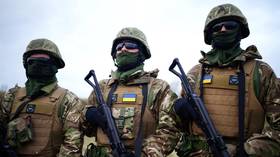
The US and its allies should have attempted to reach an agreement with Moscow as their belief that Ukraine can win a conflict against Russia is “suicidal,” iconic American investigative journalist Seymour Hersh has argued.
Speaking in a YouTube interview with the Consortium News outlet on Friday, Hersh accused the Biden administration of making “so many bad mistakes,” adding that “it’s impossible to believe just how dumb this leadership was.”
“It was suicidal to think you can win that war, that Ukraine can win the war [against Russia]. There’s just too much corruption. That was a very, very bad decision. We should have been pushing for peace, we should have made an agreement,” the former Pulitzer Prize winner insisted.
US President Joe Biden basically “blew off NATO in Europe” by telling allies that he is backing Ukraine with its “totally corrupt government,” Hersh added. The journalist also pointed out how Kiev glorifies Stepan Bandera, “the great pro-Nazi who killed Jews like crazy during World War II.”
“It’s just silly not to right away assure the Russian government that we weren’t interested in making Ukraine a member of NATO,” Hersh stated, referring to long-standing concerns in Moscow. “NATO didn’t want Ukraine anyway because of the corruption.”
Hersh recently published a bombshell report which accused the US of sabotaging the Nord Stream pipelines last year. He cited an informed source as explaining that explosives were planted on the bottom of the Baltic Sea by US Navy divers under the guise of a NATO exercise back in June 2022. They were detonated in late September, rendering the pipelines, which were built to deliver Russian gas to Europe through Germany, inoperable.
US Secretary of State Antony Blinken, as well as Under Secretary for Political Affairs Victoria Nuland and National Security Advisor Jake Sullivan, are all “very hawkish,” according to the journalist. The trio “pushed Biden very hard” to go ahead with the sabotage because “they have long-standing incredible hatred for [Russian President Vladimir] Putin. It’s almost personal, I would guess,” Hersh claimed.
US National Security Council spokeswoman Adrienne Watson branded Hersh’s bombshell report “utterly false and complete fiction.” The journalist has promised even more revelations on how the pipelines were blown up.

.jpg)
.jpg)
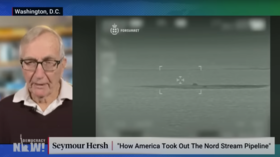


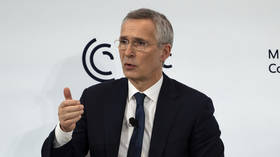

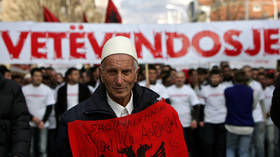
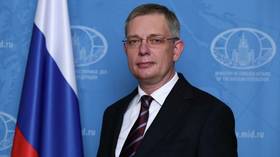



No comments:
Post a Comment